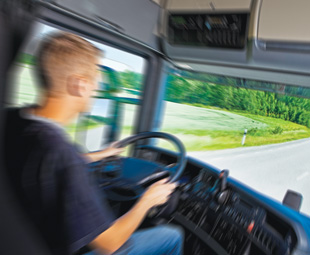Bottle to the Throttle

South Africa’s heavy truck and bus drivers are clearly unaware of the consequences of drinking and driving. The problem continues unabated
Judging by the number of empty alcohol bottles and cans that are to be seen on the verge of our country’s roads, and the unacceptable number of heavy-vehicle accidents that we witness daily, I have no doubt that many of our long-distance drivers are drinking and driving.
This appears to continue despite our Minister of Transport, Dipuo Peters, making statements that she intends to tighten laws on drinking and driving and that the country, and vehicle owners, can no longer afford the high costs of these accidents.
The question to be asked is: do our truck and bus drivers understand the severe consequences of drinking and driving?
The current law pertaining to drinking and driving is clearly defined in the National Road Traffic Act. It states that it is an offence for a professional driver to drive, or even be in the driver’s seat with the engine running, while the concentration of alcohol in any specimen of blood, taken from any part of his or her body, is more than than 0,02 grams per
100 millilitres.
The consequence of being found to be under the influence of alcohol, while driving a heavy commercial vehicle or bus, is that the Road Traffic Act allows the court to impose a fine with no statutory limit, or a sentence of up to six years, or both.
Truck and bus drivers need to be aware of and understand the other severe consequences that could occur if they are found guilty of driving while under the influence of alcohol and drugs.
They could:
• lose their job and the means to support their family;
• be scarred with a criminal offence, resulting in the loss of their Professional Driving Permit;
• have to live with the guilt of having severely injured or killed another person, as well as with the social stigma attached to being found guilty of drinking and driving.
Past tests have proved that once a driver’s alcohol limit exceeds the legal limit, he or she is far more likely to
be involved in a road accident
while driving.
Many truck and bus drivers are unaware of the effects of alcohol on their driving ability – and attitude to other road users. Many believe that they are better drivers once they have consumed alcohol.
However, the real effects of alcohol on a driver are: they become reckless and aggressive and take chances; reaction time is slower; judgement is impaired; vision is negatively affected; observation of objects becomes faulty; they have difficulty in tracking moving objects and are at greater risk of falling asleep at the wheel.
I fully support our transport minister’s intentions to tighten up the laws on drinking and driving. I would also like to see tightening up on the procedures surrounding the prosecution of all vehicle drivers suspected of drinking and driving. There are still far too many drivers who get away without being prosecuted for drinking and driving owing to judicial bungling.
One of this country’s most respected commercial vehicle industry authorities, VIC OLIVER has been in this industry for 49 years. Before joining the FOCUS team, he spent 15 years with Nissan Diesel (now UD Trucks), 11 years with Busaf and seven years with International.
Published by
Focus on Transport
focusmagsa




